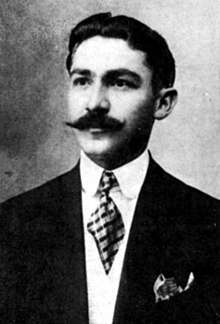João Suassuna
João Urbano Pessoa de Vasconcelos Suassuna, better known as João Suassuna (9 January 1886 – 9 October 1930) was a Brazilian politician from the Sertão region. He was the father of the playwright and author Ariano Suassuna.
João Urbano Pessoa de Vasconcelos Suassuna | |
|---|---|
 | |
President of Paraiba | |
| In office 1924–1928 | |
| Preceded by | Sólon Barbosa de Lucena |
| Succeeded by | João Pessoa Cavalcanti de Albuquerque |
Deputy in the National Congress of Paraiba | |
| In office 1928–1930 | |
| President | Washington Luís |
| Personal details | |
| Born | 9 January 1886 Catolé do Rocha, Brazil |
| Died | 9 October 1930 (aged 44) Rio de Janeiro, Brazil |
| Nationality | Brazilian |
| Political party | Partido Republicano da Paraíba |
| Profession | Politician |
Biography
Suassuna was born in Catolé do Rocha. From 1924 to 1929, he was the president[1] of Paraíba, immediately before João Pessoa. Whereas Suassuna was the defender of agricultural Sertão culture, João Pessoa was a supporter of modernisation.[2] His son Ariano wrote about the opposition between the two men:[3]
Pessoa represented the middle class of the towns and of the capital, and was in the avant-garde. My father however represented the sertanejos and the status quo. It can be said that they were the last two feudal lords of the sertão...[4]
When Pessoa became president of his state, and Suassuna a deputy, the military were worried about this situation and declared part of Paraiba independent, which provoked the then President of Brazil, Washington Luís to intervene on behalf of the national government. Pessoa was murdered on 26 July 1930 by a relative of Suassuna.[5]
On 9 October 1930 Suassuna was murdered in revenge in Rio de Janeiro where he had gone for a meeting with Washington Luís to try to find a solution to the social unrest in the sertão.
Legacy
- Ariano Suassuna was inspired by the life of his father to write the novel O Romance d'A Pedra do Reino e o Príncipe do Sangue do Vai-e-Volta.[6]
- In 1960 the Campina Grande Airport was renamed the Presidente João Suassuna Airport.[7]
Notes
- In the 1920s and 1930s, the governor of Paraiba was known as the president
- André Bueno; Literatura e sociedade, narrativa, poesia, cinema, teatro e canção popular; 7LetrasM; 2006; ISBN 9788575772836
- José Augusto Guerra; O mundo mágico e poético de Ariano Suassuno, Cultura3, pag. 96-102, Rio de Janeiro, MEC, 1971, p.100
- José Augusto Guerra; O mundo mágico e poético de Ariano Suassuno, (Cultura) 3rd volume; MEC; 1971
- Idelette Muzart-Fonseca dos Santos; Littérature/Histoire, regards croisés; Un siècle d'histoire du Nordeste dans Le Romance d'A Pedro do Reino; ISBN 9782840500643
- Mathieu Lindon (19 March 1998). "L'épopée carabinée d'Ariano Suassuna". Libération (in French). Retrieved 1 August 2014.
- Lei 3.795 2 August 1960